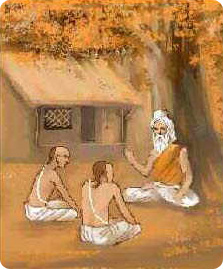Education in India
Education in Later Vedic Period
History unveils the fact that there was a well-planned system of education in later Vedic period. Education at that time began with the ceremony of Upanayana, (first described in the Atharvaveda). The student wore the skin of ntelope, the girdle of Kusa grass and collected fuel for worshipping god Agni. Begging for his preceptor was also one of his daily duties. The pupil lived with his teacher. Begging for alms was prescribed for the pupil to produce in him a spirit of humility. The student as a rule studied with his preceptor for twelve years. There were many scholars, who after completing their education wandered in quest of knowledge. They were called Charakas. There were also associations for advanced study and research. One such association was Panchala-parisad. Kings also organized conferences where philosophers participated in discussions. King Janaka of Videha organized one such Conference that was presided over by sage Yajnavalkya. The ultimate aim of education in later Vedic period was the attainment of highest knowledge, the knowledge of Brahman or Atman as the supreme reality. The purpose of education in later Vedic period was thus to achieve the utmost knowledge-the knowledge of soul and God. As stated by the scholar, Dr. Radha Kumud Mookerjee, "The ultimate aim of education was the attainment of highest knowledge, the knowledge of Bramha or Atma as the sole and supreme reality. But it can be attained only by complete conquest of desire and renunciation of the world". There were many ladies like Gargi and Maitreyi who took part in philosophical discussions. | Other CategoriesHigher Education Of Women In IndiaHigher Education in India History Of Higher Education In India IIMs in India,Higher Education History Of Indian Education Saddler Commission Education in Medieval India Education in Later Vedic Period Hunter Education Commission Educational Reforms of 1901-1904, Indian History Education in India during Pratihara period Main CategoriesForeign Degrees in IndiaCareer Options after HSC Entrance Test Examinations International Examinations Competitive examinations in India Education in India Colleges In Indian States Medical Colleges in India Management Courses in India Engineering Courses in India Professional Courses in India Academic Degree Course In India Education Governing Bodies Indian Education System Women Education in India Structure of Indian Education IITs in India Development of Education in India Online education in India Gurukul Education in Modern India |
